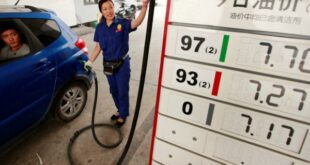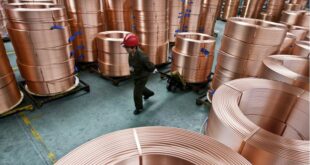Iran offered India extra crude supplies on revised terms as international sanctions tighten the Middle East producer’s circle of oil customers, according to three people with knowledge of the talks.
Indian refiners have yet to decide on whether they will take up Iran’s offer of additional shipments, the people said, declining to be identified because they aren’t authorized to speak with the media. The South Asian nation’s government is open to increasing oil imports from the Persian Gulf state, according to two of the people.
The people declined to give details on the terms offered by Iran. They may not necessarily involve lower prices, and could include more flexibility in the grades offered and loading dates, and an increase in the number of days of credit before India is required to pay, one of the people said. Iran hasn’t offered India a discount for its crude, one of the people said.
“Make no mistake, the party that’s getting hammered left, right and center at the moment is Iran,” said Praveen Kumar, an analyst at Facts Global Energy in Singapore. “They are sitting on about 400,000 barrels a day of excess crude, and it’s fair to say the Asian buyers have the upper hand at the moment.”
Iran’s offer to India follows a suspension of oil exports by the Persian Gulf nation to French and British buyers and the growing risk of losing market share to Saudi Arabia, the largest producer in the Organization of Petroleum Exporting Countries.
‘Being Clever’
The European Union and U.S. have imposed sanctions to protest Iran’s nuclear program, restricting trade and financial transactions. The U.S. and its allies say they suspect the program is a cover for developing atomic weapons, a charge Iran has repeatedly denied, maintaining it is for civilian purposes.
“Iran is being clever,” Kumar said. “It has cut supplies to Europe earlier than big buyers there expected and is now turning to its Asian customers. But still, even if India and China take up some extra supplies, Iran is still going to be left with some crude.”
Iran won’t cede its “right” to peaceful atomic energy and has mastered the full nuclear-fuel cycle, Foreign Ministry spokesman Ramin Mehmanparast said today. A team of officials from the International Atomic Energy Agency, the United Nations nuclear watchdog, arrived in Tehran yesterday for two days of meetings that provide an opportunity to defuse allegations of a military aspect to the country’s nuclear program.
Japan-China
Refiners in Japan are holding off from signing oil-supply contracts from Iran, four people with knowledge of the talks said today, while China International United Petroleum & Chemical Co. agreed to most terms of a 2012 deal with the Islamic republic, according to three other people.
India hasn’t asked the nation’s refiners to cut crude purchases from Iran, an official at the nation’s oil ministry said today. India isn’t facing any immediate issues in paying Iran, the official said, declining to be identified because the information is confidential.
India and Iran have struggled to preserve $9.5 billion in annual crude trade after the Reserve Bank of India dismantled a mechanism used to settle payments in euros and dollars in December 2010. Transactions are currently routed through Turkiye Halk Bankasi AS (HALKB), based in Ankara, which has told Indian refiners it may no longer be able to act as an intermediary, four people with knowledge of the matter said Jan. 10.
Conduit for Payments
Refiners are wary of increasing oil imports from Iran while talks on finding a conduit for payments are continuing, two of the people said today. Options being considered are a barter of oil for commodities and other products from India in transactions through an account in state-run UCO Bank, an increase of investment in Iranian infrastructure projects, as well as the use of a Russian bank for routing funds.
Payments are still continuing through Turkey’s Halk Bank and none of the alternate options have been finalized amid the escalating international pressure, two of the people said today. While Indian refiners plan to renew term contracts with Iran for the year starting April 1, continued difficulties related to payments may stall Iranian efforts to sell extra supplies, one of the people said today.
Saudi Arabia will increase crude exports to some Indian refiners as they seek to diversify supplies, four people with knowledge of the plans said Nov. 15. Saudi Arabian Oil Co., the country’s state-run producer, told refiners in India it can replace some of the Iranian crude, two people with knowledge of the matter said July 12.
Stable Supply
Saudi Arabia is ready to boost supply to other nations as well. The country is prepared to help South Korea secure “stable” crude oil supplies if the Asian country’s imports are disrupted by an embargo on Iran, the kingdom’s Oil Minister Ali al-Naimi said in a meeting with South Korean President Lee Myung Bak in Riyadh on Feb. 7. It can meet any future requests and extra demand from South Korea for oil purchases, he said.
While India has proposed paying for oil in rupees, Iranian officials have sought partial payment in yen because they’re concerned that they may not get sufficient value from the currency, which isn’t fully convertible, three people with knowledge of the talks said Jan. 23.
Iran is concerned that India’s entire oil bill can’t be paid through exports to Iran, the people had said. Iran’s imports from India are worth about $2.5 billion a year, while its annual crude sales to the South Asian nation are valued at about $9.5 billion, they said.
India opposes sanctions on Iran from anyone other than the United Nations, Ranjan Mathai, India’s foreign secretary, said Jan. 17. India continues to buy Iranian oil, he said.
The Indian government plans to take a delegation of engineering companies to Iran to explore opportunities for exports to the country, the Financial Chronicle newspaper reported Feb. 6. The exports would be in industries such as power, railways and infrastructure that aren’t under sanctions, Aman Chadha, chairman of the Engineering Export Promotion Council of India, told the newspaper.
Source: Bloomberg
 Asia Finance News Asia finance news, banking, market analysis, business, Forex, trade, Cryptocurrency as it is happening in Asia. Trusted gateway for Asian financial news.
Asia Finance News Asia finance news, banking, market analysis, business, Forex, trade, Cryptocurrency as it is happening in Asia. Trusted gateway for Asian financial news.




